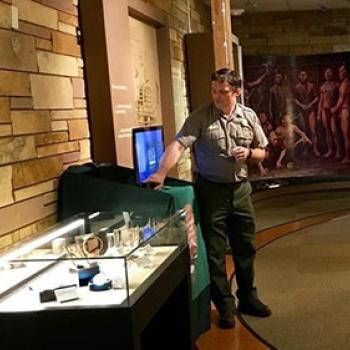Imagine unearthing the oldest known Native American home site in Southeast Ohio. Or spending the summer researching street artists rethinking urban identity in Northern Ireland. Imagine mapping cemeteries in Southeast Ohio to reconstruct the history and culture of mining towns. Imagine empowering local communities through social justice efforts at the intersections of global economies and local markets.
Students majoring in Anthropology at OHIO have opportunities to get these types of experiences by working with faculty dedicated to bringing their real-world experiences into the classroom.
Students who major in Anthropology receive training in the core subfields of the discipline and choose from a variety of topics that allow for greater specialization. Members of the faculty have conducted extended research in Africa, South Asia, Southeast Asia, Eastern Europe, Latin America, and the United States.
Choose What You Want to Learn
-
Anthropology Major B.A.
Students who choose to major in Anthropology receive training in the core subfields — Biological Anthropology, Archaeology, and Cultural Anthropology — and select from a flexible range of courses that best suit their interests.
-
Minor in Anthropology
Students majoring in another subject may find a Minor in Anthropology useful, working closely with a faculty adviser to ensure that they develop a program that enhances their major.
-
Honors Tutorial College Anthropology B.A.
The Honors Tutorial College offers a B.A. in Anthropology that provides unique opportunities for exceptional students. At the heart of the program is the tutorial, in which the student studies selected material under the guidance of a faculty member acting as tutor.
What Are the Three Subfields of Anthropology?
Because of its wide range of subject matter, anthropology at Ohio University is organized into three subfields that share a common focus on humankind and form a unified academic discipline. Students develop a general knowledge of anthropology and have the option to gain more specific in-depth knowledge in the subfield of their choice.
The subfield options are:
- Archaeological anthropology, involving the excavation, description, analysis and interpretation of extinct cultures.
- Sociocultural anthropology, which focuses on the description, analysis and interpretation of existing cultures and is interested in both particular and universal features of these cultures.
- Biological anthropology, which is concerned with human beings as biological organisms from the past to the present.
By virtue of their common focus on humankind, these subfields form a unified academic discipline. Undergraduate students are expected to acquaint themselves with a general knowledge of anthropology while they gain a more in-depth knowledge in the subfield of their choice.
Get Hands-On Experience with Your Anthropology Degree
Our anthropology program provides important experiential learning opportunities for students. What you learn in class is also valuable and applicable in the field, so you’ll get the chance to participate in research projects, internships and more.
-
Add an Internship to Your Resume
The Anthropology Internship (ANTH 4910) provides opportunities for you to work on a project with a sponsoring organization. It's a way to apply your anthropological expertise to contemporary issues and problems.
-
Spend Your Summer on a Dig
The Field School in Ohio Archaeology provides you with an opportunity to explore your interest in archaeology and learn field methodologies while studying ancient habitation sites in southeastern Ohio.
-
Earn Departmental Honors in Anthropology
Pursuing Departmental Honors in Anthropology allows advanced anthropology students the opportunity to work closely with faculty and conduct independent research.
-
Conduct Research and Present at the Student Expo
Ohio University funds competitive grants for undergraduate research projects and holds an annual research symposium, the Student Expo, which enables students to present their work to the university community.
-
Join an Anthropology Club
Make the most of your college years by joining an organization related to your major, like the Ohio Student Anthropology Society of the Students for Law, Justice & Culture.
Study Abroad in Northern Ireland or South Africa
How to Match an Anthropology Degree to Your Interests
To earn a B.A. in Anthropology, students take 11 courses in Anthropology, including introductory courses in cultural, biological and archaeological anthropology. Students work with an adviser from the Anthropology program to select from a flexible range of courses that best suit their interests and Ohio University's requirements for graduation.
Because Anthropology has applications to and connections with so many other disciplines, students are encouraged to plan their program of study to include courses from Biological Sciences, Geological Sciences, Geography, History, Sociology, and Psychology. They are also encouraged to take courses from other academic programs in which Anthropology faculty members participate, such as International Studies, Classics, and Women's, Gender & Sexuality Studies.
Ohio University's Field School in Ohio Archaeology gives students the chance to receive hands-on experience in current archaeological techniques and laboratory analysis of archaeological material in a field school taught by Ohio University Anthropology faculty.
Add a Certificate to Your Anthropology Degree
-
Social Justice CertificateThe Social Justice Certificate's interdisciplinary courses provide an understanding of social disparities and structural inequalities associated with race, class, ethnicity, gender, sexuality, nationality, and other identities.
-
Food and Society CertificateThe Food and Society Certificate covers the cultural significance of food; how food is grown, treated, harvested, sold, purchased, and consumed; and the impact these practices have on suppliers, consumers, and the environment.
-
Certificate in Law, Justice & CultureThe Center for Law, Justice & Culture invites Ohio University undergraduate students from all majors to apply for the Certificate in Law, Justice & Culture, which provides students with intellectual training in a "law and society" perspective.



